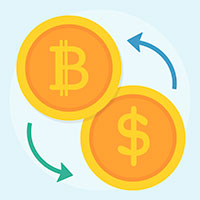People involved in the financial industry should know that trading in the forex market is different to trading in the stock market, although they are both parts of the broader financial market. Traders, nowadays, have access to a growing number of financial assets so deciding which market to trade is rather complicated as there are various factors to consider prior to making a choice.
One of the most important factors is traders’ tolerance to risk as well as their trading style and requirements. For instance, the stock market attracts buy-and-hold investors, whereas the forex market is appealing to shorter-term traders like swing traders, day traders or scalpers because of its more intense volatility.
While trading forex refers to exchanging & speculating on international currencies, trading stocks includes buying, selling & speculating on shares of different companies. If you are planning to enter the financial markets but are confused as to which market to choose, then read on. This article provides basic information about the forex and stock market and outlines some of the main differences between the two markets and the factors you should consider prior to choosing.
The stock market
When referring to the stock market, we are actually referring to various exchanges or other venues within which companies’ shares, which are publicly held, are bought and sold. In other words, the stock market is the place where buyers and sellers from all around the world, meet, interact and exchange public operations’ equity shares. Trading is conducted through several institutionalised exchanges and OTC marketplaces which operate under specific regulations. Examples of such exchanges are the New York Stock Exchange (NYSE) and the Nasdaq.
Traders in the stock market, or stock exchange, buy or sell shares on one or more of the stock exchanges which make up the general stock market. Because of the huge number of participants in the market, people buying and selling get fair pricing, high liquidity and transparent conditions regarding transactions. Moreover, stock markets have a vital role in the overall free-market economy as they give all types of investors democratised access to trading and exchanging capital.
The forex market
The foreign exchange market also referred to as FX or forex market is a decentralised marketplace for trading national currencies globally. It allows participants to buy, sell or exchange currencies for hedging or speculation purposes. The market consists of banks, companies, investment management firms, hedge funds, investors or retail forex brokers and is considered the largest financial market worldwide with a $6.6 trillion daily trading volume.
What makes the forex market unique is that it is an over-the-counter (OTC) market meaning that there is no centralised exchange but rather transactions occur electronically through computer networks among traders globally. Also, the market is open 24 hours per day, 5 and a half days per week and trading occurs across every time zone in the major financial centres of Frankfurt, Hong Kong, Paris, New York, Sydney London, Singapore, and Zurich and Tokyo.
Differences between forex and stocks
As already mentioned, the forex and stock market are the two most popular markets globally. The main difference between the two is the actual product you are trading, that is forex vs stocks. So, this will be based on whether you are more interested in trading currencies or stocks. However, there are more differences and it is important that you know which is more suitable for your trading plan and requirements. Below are a few more differences between the two markets.
Trading hours & market factors
The opening and closing hours of a market can greatly impact your trading regarding the time you will need to monitor the markets. As mentioned above, the forex market is open 24 hours a day five and a half days a week. As a result, traders can benefit from numerous trading opportunities. However, there is always the risk of the market moving while you aren’t monitoring it. So, a risk management strategy should always be in place to avoid unnecessary losses.
The best time to trade forex, in general, would be when the market is highly active. This usually happens when two sessions overlap, which is the time when there is a big number of buyers and sellers. Trading stocks is a bit different though, in that it is only available when the given exchange the shares are listed on is open. Nevertheless, there are extended hours offered to traders, meaning that they can quickly react to news although the market might be closed.
It is of high importance to know what drives the market prices. Both markets are influenced by supply and demand, but there are more factors. In stocks trading, you need to keep an eye on factors like a company’s level of debt, cash flow or earnings, while with forex trading, you need to focus on unemployment, inflation or political news and events.
Volatility, liquidity & leverage
Forex is considered the most liquid market in that there is a big number of active traders and always someone willing to buy or sell. The stock market is not so liquid besides popular stocks like Apple or Facebook, for which there is always someone willing to buy or sell. However, it is very easy to access and trade stocks.
The forex market is also extremely volatile, which means that there might be unpredictable fluctuations in prices. In the stock market though, there are more stable price changes which can be easily tracked over time. In both cases though, it is important that traders keep an eye on the factors affecting prices, like political or economic events and more.
Leverage is another factor usually found in the forex market It refers to the ability of traders to trade with a bigger amount than the one they have initially deposited. It is also applicable when trading Contract for Differences (CFDs) on stocks. However, forex traders usually have a higher leverage ratio. Keep in mind though that leverage has risks as well.
Final thoughts
There is no definite answer when it comes to forex vs stocks and which market to trade. In the end, it all comes down to your personal style and risk attitude. The forex market provides a faster-paced environment with multiple opportunities for shorter-term traders, while the stock market is more suitable for those interested in less volatility and short to mid-term trends.
 For active traders and investors, mastering the art of trading volatility is a crucial skill. Volatility, in financial terms, refers to the extent to which asset prices fluctuate over time. High volatility markets experience rapid price swings...
For active traders and investors, mastering the art of trading volatility is a crucial skill. Volatility, in financial terms, refers to the extent to which asset prices fluctuate over time. High volatility markets experience rapid price swings... The global financial market operates as a dynamic ecosystem, where understanding the connections between different market movements can provide invaluable insights for forecasting...
The global financial market operates as a dynamic ecosystem, where understanding the connections between different market movements can provide invaluable insights for forecasting... The forex market, also known as the foreign exchange market, stands as the largest and most traded financial market globally. FXTM is committed to equipping our clients...
The forex market, also known as the foreign exchange market, stands as the largest and most traded financial market globally. FXTM is committed to equipping our clients... Cryptocurrency trading has rapidly grown into a bustling and dynamic market that attracts traders from around the world. With the potential for significant profits...
Cryptocurrency trading has rapidly grown into a bustling and dynamic market that attracts traders from around the world. With the potential for significant profits... The year 2023 has been a landmark period for the international broker Octa (formerly known as OctaFX), characterized by significant achievements and substantial contributions...
The year 2023 has been a landmark period for the international broker Octa (formerly known as OctaFX), characterized by significant achievements and substantial contributions...